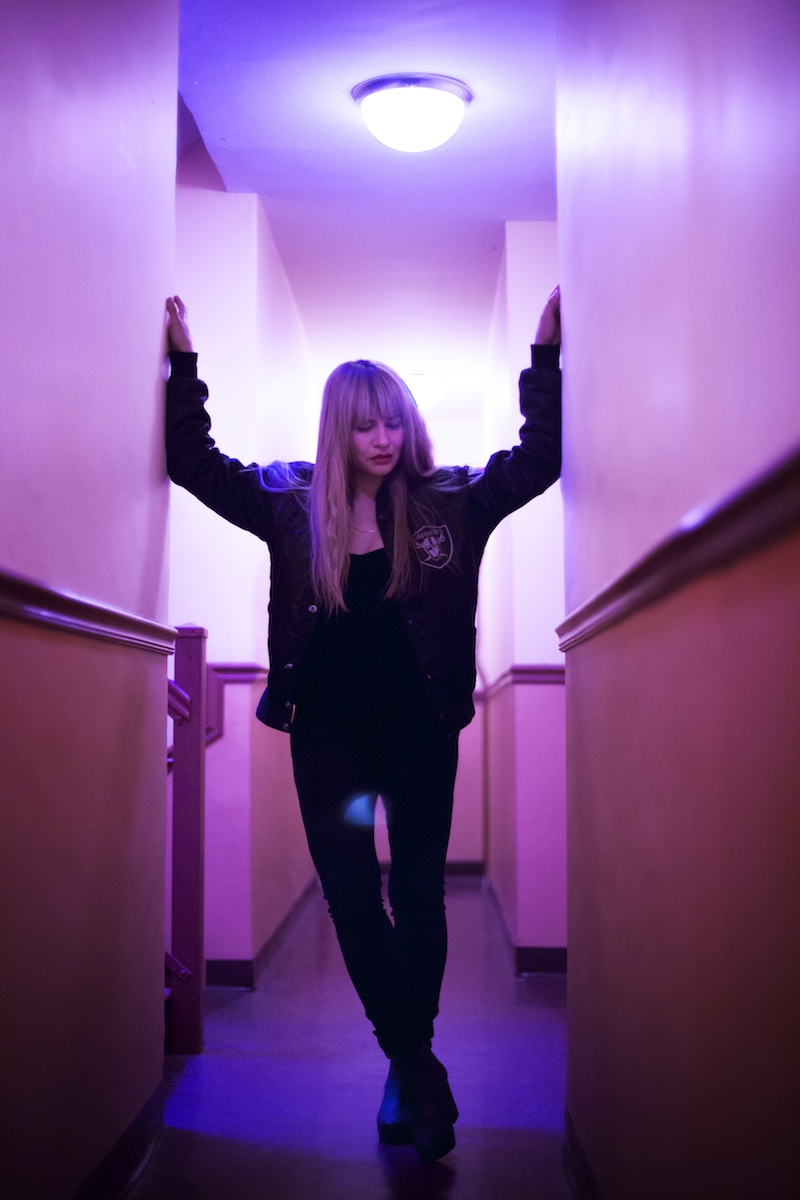The Wild Heart of Frankie Rose

ABOVE: FRANKIE ROSE. PHOTO BY BENJAMIN STELLY
Herein Wild, the third album from Brooklyn garage-pop musician Frankie Rose, opens with a statement: a driving bass drum and punches of guitar, building into the moment when Rose’s ethereal voice drifts in to temper the confrontational intro. This album is altogether different from the spacey dream sequences of 2012’s Interstellar and the girl-group revivalism of Frankie Rose and the Outs (as well as her previous work with Vivian Girls and Dum Dum Girls). This is a tighter, darker album, with lyrics that very often veer into existential-dread territory: “This is the wild, where hearts, they are heavy at best / Here is easy to see how an end would be rest.”
When we called Rose on a sunny Indian-summer Saturday, though, she was every bit as friendly as we’ve found her in the past. She was getting a pedicure, she explained. She was thinking fuchsia.
ALEXANDRIA SYMONDS: Herein Wild feels like a more grounded record than Interstellar.
FRANKIE ROSE: Yeah. That’s exactly right. But to take it even further—Interstellar really was a long-winded album. It was in steps, and it took me a really long time to make, and it was really spacey ethereal, exactly like the name. It was right in line with the name, but I feel the same way about Herein Wild. It was made in literally a month and a half.
SYMONDS: Wow.
ROSE: I made the demos before that, about the amount of time that was allotted because of the record schedule. The label’s record schedule was about a month and a half; it took 12, 14-hour days in the studio with maybe two days off in that month and a half. It really is a body of work—the only thing I can compare it to is a series of paintings that a painters been working on. It does make it a very grounded album, because it is exactly what was going on with me. [laughs]
SYMONDS: Yeah, definitely.
ROSE: There wasn’t a lot of time to think about it. I write my lyrics on the fly, either the night before I go to bed or the morning of when I know we’re going to work on that song. I don’t think that the lyrics are what I was necessarily feeling in the moment, but I think it was a buildup of the entire year after Interstellar. It sort of just came out, whether I liked it or not. There’s very serious themes running through Herein Wild that now that I’m sort of out of it a little bit, I can see how it’s more of a concept album than Interstellar. It’s pretty dark. It’s not the happiest of albums. The songs are light, but I feel like it’s got that irony. The saddest pop song you’ve ever heard.
SYMONDS: Yeah, totally. That was something I actually wanted to ask you about—how much the awareness of the actual kind of quality and timbre of your voice comes into your songwriting. Part of what’s so satisfying about this album, for me, is the way that the darkness or depth of the lyrics and some of the instrumentation plays against the timbre of your voice, which is genuinely very sweet and pure, and you must be aware of that.
ROSE: I’m really aware of my vocal capabilities—what I can get away with. I think the reason why, and how I record my vocals, has a lot to do with what I’m capable of. If I could sing like Beyoncé or something, I might be doing something completely different. When I’m recording a vocal line, I’m like, “Can I get away with doing this? Is my voice strong enough? And does it need a harmony underneath of it? Is it powerful enough by itself?” This is something that in the process of making a record, I think about. I definitely challenged myself more in this one, even, by putting my vocals more in the front, which is not what I used to do. I used to do My Bloody Valentine-style—shove them under the guitars and call it a day. Soak ’em with reverb and there you go. I’m trying to not do that anymore.
SYMONDS: Yeah, there’s more access to the vocals here. They’re more in the foreground, which I think is awesome.
ROSE: Yeah, but it’s a little scary for me. Because really caring about your vocal takes and trying to sing is hard. [laughs]
SYMONDS: [laughs] Herein Wild makes me think a lot about places I’ve traveled, discovering what’s familiar in unfamiliar territory. What’s your favorite kind of landscape? Do you like being surrounded by people or by yourself?
ROSE: I think I’m an introvert/extrovert. My body has to be alone to recharge, but I do love to be around people. I don’t know. It’s hard to say. New York City is my favorite landscape—where you can have the most anonymity and also be surrounded by people at all times. This album is definitely a pretty lonely album, for sure. It’s a desolate album, is what it is. Even if it doesn’t really feel like that in the songs, it feels like that to me, for sure—like a desert landscape.
SYMONDS: Yeah, I think that the song that probably sounds most like Interstellar, to me at least, would be “Cliffs as High,” but even that song basically is about falling to earth, right?
ROSE: Yeah. And it’s about dreams. There’s definitely a theme of dreams and being your body, being trapped in a body on earth. There’s definitely a theme of dreaming and seeing things from this perspective of being here.
HEREIN WILD IS OUT TOMORROW, SEPTEMBER 24. FRANKIE ROSE PLAYS THE BOWERY BALLROOM TONIGHT, SEPTEMBER 23, WITH TAMARYN. FOR MORE ON THE ARTIST, VISIT HER WEBSITE.






